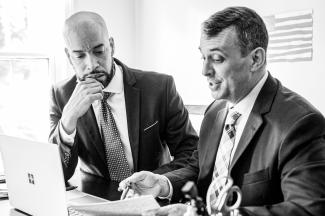
Jason Howell, CFP®, CPWA®, CSRIC® (left); Doug Tees, MBA, CFP®, CAP®, CBDA (right)
Letter to Stakeholders, August 2025
Wednesday, August 6, 10:15 am EST. There has been a lot of recent news (noise) about tariffs, taxes, markets and deficits. Early reporting shows that that the largest US corporations are poised to receive billions in cash (tax) savings while some CEOs are literally being paid in the billions. Despite the potential $5 trillion cost estimated by the Congressional Budget Office, the recently passed tax bill has undergirded strength in your steadily climbing account balances this year. Thanks to the rise of so-called, “Artificial Intelligence,” there are many investors who are “partying (trading stocks) like it’s 1999” but some analysts are beginning to worry about the comeuppance that followed in the year 2000. Are we in a similar technology stock related bubble? What would happen to your portfolio – and more importantly your plans – if the markets dropped by 20% or 30% tomorrow?
Preparing for Bad Weather
The weather all around the country this year has been atypically terrible. Incredibly hot it some areas and quite stormy in others. While some look for who to blame, others have questioned how to prepare communities for future (inevitable) calamities. We connect our investment philosophy to the latter approach.
These days the stock market’s prices are considered “expensive” or “overvalued” relative to the current earnings of major companies. This is measured by the “price to earnings ratio” or P/E. The historical average P/E is about 20 for the market’s 500 largest companies. This means that for every dollar of current earnings, the stock market expects 20 more dollars of future earnings. As of this week, the P/E is averaging about 26. That’s about 30% higher than the average but not the highest average or even close to the recent high of about 34 in 2020. But if we were worried about a high P/E signaling an eminent stock market crash, what would we do? We would first assess the potential damage to your financial plan and then add “investment buffers” to your portfolio. These “buffers” would include money market investments for your immediate cash needs and structured note investments (that work like bonds but better) to weather the storm. And in fact, this is exactly what we have (already) done.
Our default position is to protect the plans you have for your family while we manage the risk associated with growing your accounts. This is the constant work of perfecting your “all weather portfolio.” Do you have questions about investing based on what you’ve been hearing? Just email Jason@JasonHowell.com or Doug@JasonHowell.com.
Artificial Intelligence (AI)
Driving much of the corporate growth over the past few years has been the use-case recognition of so-called “artificial intelligence.” Your IT friends will tell you that AI has been around for decades but for most people, it truly “launched” with the popularity of ChatGPT in 2023. Large language models (LLMs) like ChatGPT, Perplexity and Claude are the backbone for so many AI tools that complete human-like responses from direct human requests. AI Agents actually problem solve in anticipation of human requests. The fact that these requests can be made with regular language rather than programmer language (code) is what has animated the imagination of what’s now possible.
AI is already all around us in the form of the technology that curates our Netflix and YouTube feed (suggestions), the GPS directions in our phones and even the Calendly application we use to schedule meetings. We are looking to AI to create efficiencies in our service to you and eventually as bigger users, to better understand how AI will continue to drive markets. We also recognize the need to “level up” our security as we explore. This is why we’ve recently hired the team at Venn.com to secure the work we do on your behalf on whatever hardware (computer or phone) we use while we work. I have personally taken an interest in AI and have uploaded my book JOY of Financial Planning to a private LLM. To test my book on personal finance questions, Click Here.
George Mason University
Last month I highlighted the work we as a firm do in philanthropy and my recent appointment to George Mason University’s Foundation board of trustees. GMU’s recent investigations from the federal government have shown that being a trustee is not just about attending galas, dinners and fundraising. I am heartened by the support of the Northern Virginia community and in particular the GMU Board of Visitors. Their unanimous vote of solidarity to give President Gregory Washington a raise was affirming. If you would like to know more about George Mason University’s history and value to the community writ large, just email Jason@JasonHowell.com.
Jason J. Howell, CFP®, CPWA®, CSRIC®
President
Jason Howell Company is a family wealth management firm that strengthens the finances of families making the transition from first generation success to family wealth. We envision a world where wealthy families give, grow and govern themselves in ways that enrich their local communities. We do this by reducing the fear, isolation and guilt associated with financial success.
Jason J. Howell, CFP®, CPWA®, CSRIC® and Douglas W. Tees, MBA, CFP® CAP®, CBDA have spent a lot of time in the Washington, DC area, and are aware that many people who are first generation wealth suffer from a kind of "financial imposter syndrome." Successful entrepreneurs and family businesses are always looking over their shoulder; government contractors worry about the next contract; former Capitol Hill staffers privately wonder if they should "feel bad" for the money they now make. Imposter syndrome is common among people who work for the many corporate headquarters based in this area as well. These feelings get in the way of properly managing family wealth. We empower them to get organized, build a team of advisors and make decisions.
Our typical "first generation wealth" families include dual income parents who work, save and have just the right amount of fun. For long-time, family owned businesses we focus on much family preservation as we do wealth preservation.
First generation wealth success stories and family business owners realize that they:
- Need to “do something” with the cash in their checking/savings
- Need to eventually diversify their portfolio away from the family business
- Need an investment strategy for “up” and “down” markets
- Need a plan to mitigate market, credit, inflation, and political risks
- Need to start tax planning instead of just tax paying
- Need to be sure they are choosing the right work benefits
- Need to reduce financial miscommunications between family members
- Need to separate business finances from personal finances
- Need to separate family wealth from individual wealth
- Need a plan to provide space for both family and individual philanthropy
- Need to plan for money while alive and for what happens after death
To learn more about our unique offering, contact us for a complimentary initial strategy session: click here.


